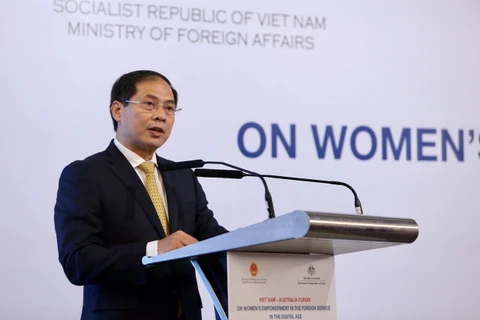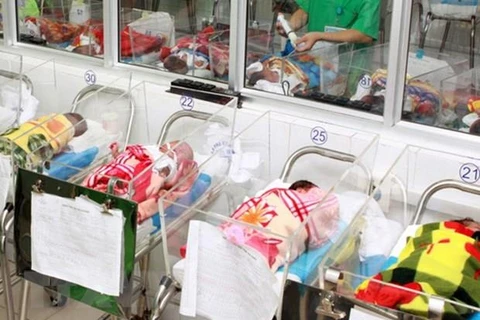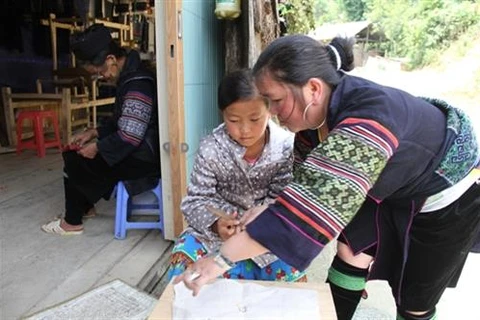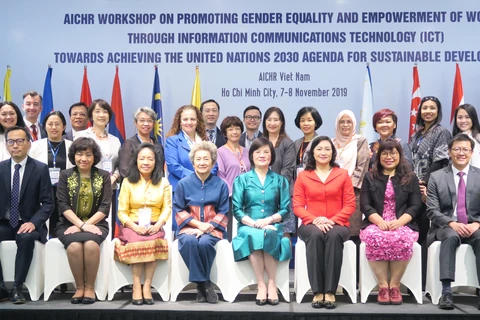Hanoi (VNA) - Vietnam is one of the countries that have actively responded to the 16 Days of Activism for No Violence against Women and Children, and called on all people to join such efforts.
The Ministry of Labour, Invalids and Social Affairs, the United Nations Population Fund (UNFPA) and the Korea International Cooperation Agency (KOICA) on December 19 jointly held a workshop reviewing a communication campaign on gender equality and gender-based violence prevention.
In 2016, the Vietnamese Government officially assigned the Ministry of Labour, Invalids and Social Affairs (to coordinate with other ministries, sectors and localities to implement an action month for gender equality and gender-based violence prevention (November 15 - December 15).
The month-long campaign has attracted the participation of ministries, agencies, organisations and 63 cities and provinces.
Deputy Minister of Labour, Invalids and Social Affairs Le Van Thanh said the annual campaign has helped to improve public awareness of this issue, adding that that many cases of violence against women and children have been denounced by the public, and handled by competent agencies.
Rah Mi-Hye, KOICA Deputy Director, said gender-based violence has remained a problem facing both developed and developing nations, which has affected women from different economic sectors, and caused serious consequences, not only to victims but national socio-economic development.
KOICA will continue to join hands with Vietnam in carrying out activities to protect rights of women and girls, thus further promoting cooperation between Vietnam and the Republic of Korea (RoK), the official stressed.
The agency highly values Vietnam’s achievements in promoting gender equality and eliminating violence against women and children, as well as its issuance of the Law on Gender Equality, and the National Strategy on Gender Equality, she noted.
The Vietnamese Government has acknowledged, respected, ensured and protected human rights and rights of citizens, she said, stressing the country’s efforts in fighting discrimination against women and girls, and gender-based violence by issuing relevant laws and realising international commitments such as the Convention on the Elimination of All Forms of Discrimination against Women, and the UN Convention on the Rights of the Child.
Vietnam has granted health insurance cards to all children under six years old. The national expanded vaccination programme has targeted nearly all below-one-year-old children, and nearly five-year-old children attend preschools. Up to about 90 percent of children who live in special circumstances enjoy the benefits of social welfare policies.
The Vietnam Women’s Union (VWU) has designated 2019 as the safe year for women and children, aiming to mobilise the engagement of the entire political system and society in joint efforts to ensure safety for the groups.
These efforts have been made for many years, contributing to realising sustainable and millennium development goals, as well as the 2011-2020 national strategy of gender equality, Nguyen Thi Tuyet, VWU’s Vice President said.
This year’s programme focuses on safety for women and children in different environments such as family, school, workplace and social network, along with food safety and hygiene.
Up to 61 women and seven children suffered from domestic violence and three children were victims of sexual abuse each day during 2012-2015, according to the union.
Statistics showed that last year, more than 8,000 women were victims of domestic violence in Vietnam, accounting for 85 percent of all domestic violence victims.
According to the United Nations Women, 34.4 percent of Vietnamese women have suffered sexual violence, the second highest rate in Southeast Asia.
Last year, more than 1,500 children were sexually abused in the Southeast Asian nation, and 2,000 cases of school violence were reported.
Although there have been many programmes and policies aimed at intervention and protection, they have proved insufficient to safeguard women and children./.
























